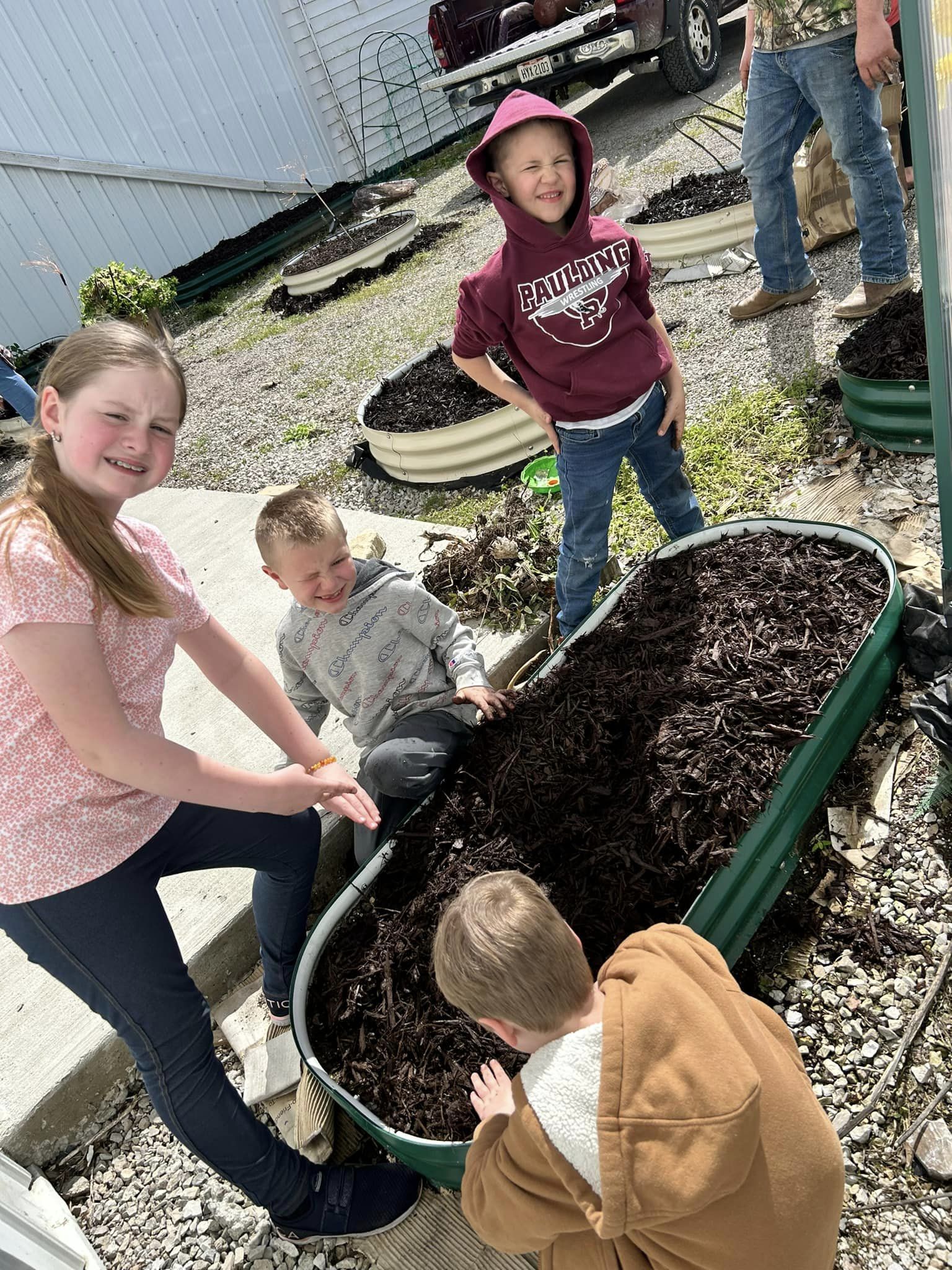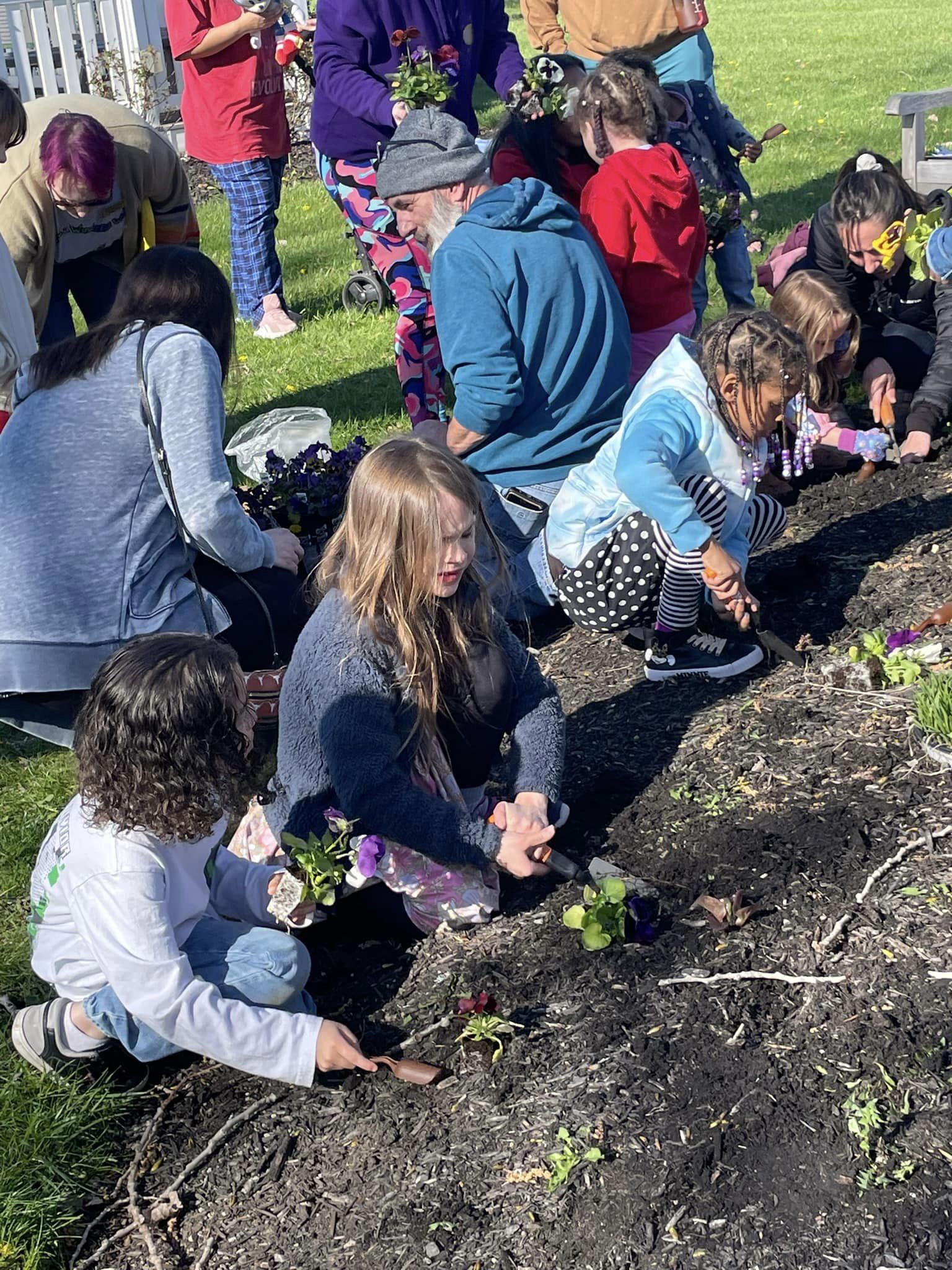Growing library garden programs

Library gardens offer a great way for community members to come together to learn, grow, and contribute towards a healthy, balanced environment. And creating a vibrant community green space or gardening program doesn’t have to be complicated. Across the country—and beyond—libraries are growing gardening programs in their own unique ways. As you explore some of the gardens and programs here, you’ll notice that community partnerships represent a common thread running throughout all of the programs. Local businesses, master gardening groups, arts organizations, and community government can all play important roles in growing a successful library garden program.
Library garden inspiration
Library gardens
- The city of Portage (Indiana) is teaming up with Portage Public Library to create a new library garden, which will feature places to read, spots for library programming and community events, and a new trail that will connect the library and garden.
- Cooper Community Library (Ohio) welcomed a local 5H 4H club to help get their new library garden started. The library plans to start a summer garden club for kids, offering the chance to learn about all parts of the growing process from planting to caretaking to harvesting and processing vegetables and fruits.
- The Read & Feed Community Garden (Michigan) grew from a partnership between Harrison District Library and H&R Block, which donates land and water for the garden. Community members can “check out” their own plot, and excess produce is donated to the Stone Soup Project.
- Kilcullen Library (County Kildare, Ireland) and local partners transformed a neglected space next to the library into a community garden, complete with a wild meadow, herbs, raised beds for vegetables, and a picnic area. This Kilcullen Diary article tells the story of the garden’s opening and picnic.

Gardening and learning together
- Spokane Public Library (Washington) offers a variety of gardening- and conservation-related programming, including a workshop series called Water Wise Wednesdays, where participants can learn about topics like integrated pest management, water conservation, and more.
- Glendora Public Library (California) is offering a unique story walk in their library garden—an edible plant stroll that invites visitors to walk and learn about edible plants in California.
- Community members got their hands dirty during the Composting with worms program at Benjamin L. Hooks Central Library (Tennessee). Participants had the chance to learn about this method of composting, and three people got to take home their own worm bins.
- Somerville Public Library (Massachusetts) and Green City Growers are hosting a series of urban gardening workshops to help community members learn how to care for an urban garden all year long—from “waking up the garden” in spring, to planting and harvesting throughout summer and fall, and winterizing the garden at the end of season.
- Olympia Timberland Library (Washington) has a community garden that engages homeless patrons and non-profit neighbors.
Sharing seeds, sprouts, and more
- Charleston County Public Library (South Carolina) offers seed libraries at fifteen branches to help community members start their own gardens.
- Barnwell County Public Library (South Carolina) has launched a new seed library, and they also offering gardening tool kits for guests who are new to gardening and don’t have their own.
- The Garden Cuttings Library at the Bibliothèque Saul-Bellow (Montreal) offers visitors a chance to exchange potted garden cuttings with other community members.
- Blue Ridge Women in Agriculture partners with Ashe County Public Library and Watauga County Public Library (North Carolina) to offer seed libraries where community members can choose from open-pollinated vegetable and flower seeds.
- Check out Sow connection with seed libraries (WebJunction article) for more examples of how libraries are sharing seeds in creative ways.
Helping kids dig in

at Patterson Library on Facebook
- West Chester Public Library (Pennsylvania) welcomed local children to participate in their Secret garden terrariums program, which is part of the nearby Longwood Gardens Community Read program.
- Patterson Library (New York) hosted an Earth Day planting event with community partners CCSD SEPTO and Troop Inspire. Children gathered to help plant a sensory garden in the library park.
- Reading Public Library’s Plant Lab (Massachusetts) invited kids to design the library’s patio garden by picking out seeds and visiting the library throughout the season to help care for them and check on their progress.
- River Valley District Library (Illinois) got whimsical with their Fairy garden program. Kids were invited to plant their own mini gardens and decorate them with fairy décor.
- Middle Country Public Library's Nature Explorium (New York) is an outdoor learning space for children and families. Learn all about this innovative garden in a WebJunction webinar, Explore and discover: nature-based spaces and activities at your library and read more in the Growing nature literacy in libraries resource book (PDF).
Protecting pollinators
While vegetable and herb gardens are often a popular choice for library gardens, many libraries are choosing to plant pollinator gardens. These gardens can be tailored toward native species that are easier to care for and can benefit native pollinators, while allowing children and other community members to learn more about their local ecosystems. Here are a few examples:
- Blount County Public Library (Tennessee) hosts events and learning opportunities for kids in its pollinator garden through their STEAM Kids program.
- Effingham Public Library (Illinois) is creating a new Butterfly Hotspot, which will feature native plants like butterfly weed, Little Bluestem, Black-Eyed Susans, and Prairie Dropseeds.
- Camas Earth Day Society is teaming up with Camas Public Library (California) to help create and install a new pollinator garden, which will supply their beehives with plenty of nectar.
Get growing: Resources, tips, and inspiration for your library garden
Community partnerships are crucial to a thriving library garden program. One impactful partnership example is the Fruitful Libraries Resolution in DeKalb County, Georgia. Local groups partnered with the county government to dedicate existing landscaping funds to transform the greenspaces of all 23 county libraries into regenerative landscapes. These greenspaces will include edible, native, and pollinator-friendly plants, with the goal of building more resilient ecosystems. Read on for more partnership ideas, plus resources and tips that can help inform your library’s approach to gardening with your community.
- Community gardens are cropping up at public libraries everywhere: This article by Noah Lenstra on Shareable offers an overview of library gardening programs, plus inspiration from libraries and links to further reading.
- Seeding Community and Hope: This School Library Journal article gives a brief overview of library gardening and some tips for getting started.
- The Buzz on Library Gardens: Listen to this Call Number with the American Libraries Podcast episode to hear how libraries are getting creative with their gardening programs.
- Food for thought: building a better community through food: This Washington State Library webinar recording covers how libraries are becoming community food hubs through library gardens, lending libraries, and partnerships with community gardens and farmers.
- Where monarchs reign: Read about how libraries are dedicating part of their outdoor spaces to pollinators.
- Let's Move in Libraries: A website collecting resources related to gardening in library programs, as part of movement-based programs.
- Let’s Move! (archived site): An initiative launched by First Lady Michelle Obama to encourage physical activity and access to healthy, affordable food for kids and families. Check out the Gardening Guide section for resources for home, school, and community gardens.
- Integrating outdoor spaces into library design: a whitepaper from Bond Architects on considerations to look into before starting a library garden, different types of gardens for your library to explore, and step-by-step processes for establishing a successful library garden.
- The Edible Schoolyard Project: This project promotes student learning about nourishment, stewardship, and community and includes resources useful to library garden projects.
- Slow Food USA's National School Garden curriculum offers resources to support activities in school gardens.
- SC Plants the Seed: An initiative that improves South Carolina residents’ access to fresh produce at their local libraries through a collaboration between stage agencies, the SNAP-Ed program, and farmers.
Read and weed: Gardening booklists to inspire your library garden
- Gardening and yardening: Whether you're gardening or "yardening," these books will help plant the seeds to grow beautiful spaces.
- Organic gardening: This list is packed with tips, tricks, and inspiration to help you cultivate a thriving garden without harmful chemicals.
WebJunction resources
For further reading and resources, check out these WebJunction articles and webinars:
Articles
- Sow Connection with Seed Libraries: Seed libraries offer another great way to connect with community members. This article offers tips for getting started, and examples from libraries all over.
- Hunger-Free Libraries: Food Pantries and Fridges: Read about creative ways libraries are helping to address food insecurity in their communities.
Webinars
- Food Access and Seed Libraries in Rural Public Libraries: Presenters from small and rural locations in South Carolina share their experiences with seed libraries and community refrigerators.
- Strengthening Communities: Food Access at Your Library: This webinar shares examples of library food access initiatives including seed libraries, community gardens and farmers markets.
